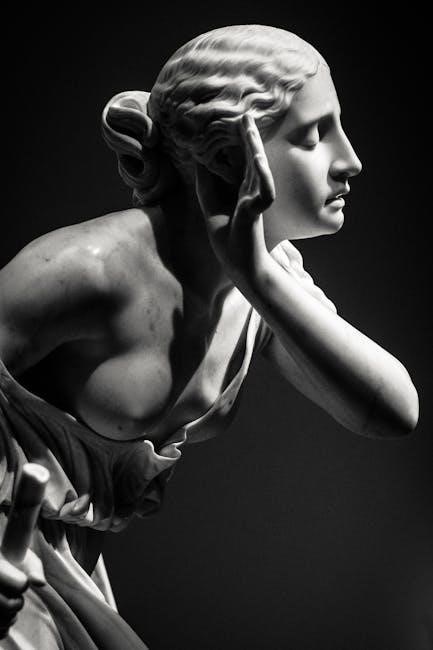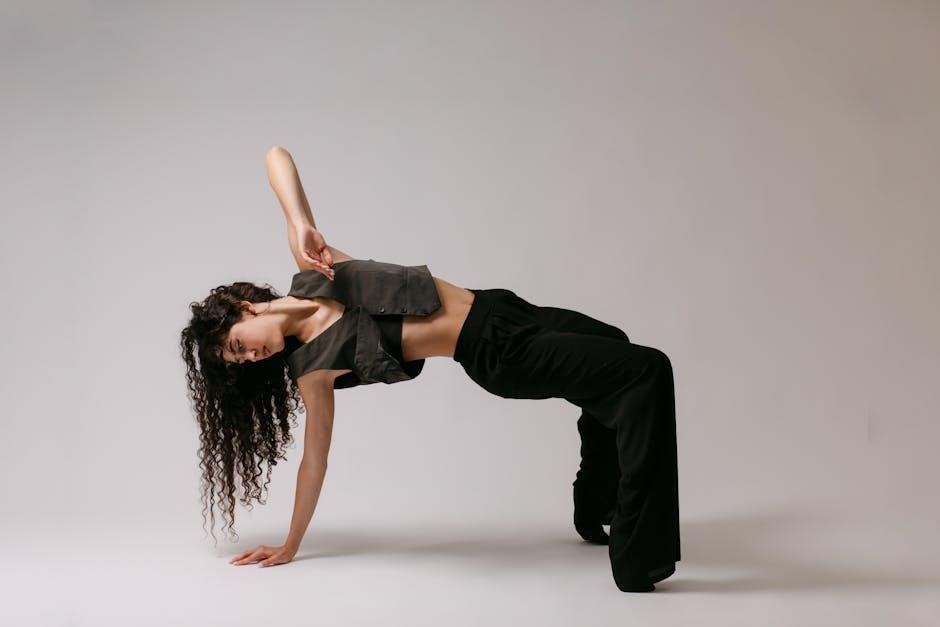theology of the body pdf
Pope John Paul II’s Theology of the Body is a comprehensive teaching on human dignity‚ sexuality‚ and the body as a gift from God‚ rooted in Scripture․
Overview of the Theology of the Body
The Theology of the Body is a series of 129 catechetical addresses delivered by Pope John Paul II between 1979 and 1984․ It explores the dignity of the human body‚ sexuality‚ and relationships‚ emphasizing the body as a gift from God․ Rooted in Scripture‚ the teachings highlight the unity of love and life‚ challenging modern views on human sexuality․ The theology underscores the sacramental nature of the body‚ connecting it to the mystery of Christ․ It provides a holistic understanding of human personhood‚ integrating faith‚ reason‚ and experience․ This doctrine has become a cornerstone for Catholic teaching on marriage‚ family‚ and human dignity‚ offering insights into living a virtuous and meaningful life․
Significance of the Theology of the Body in Christian Doctrine
The Theology of the Body holds profound significance in Christian doctrine by offering a comprehensive understanding of human dignity‚ sexuality‚ and relationships․ It bridges the gap between theology and anthropology‚ emphasizing the body’s role in revealing God’s plan for humanity․ This teaching counters modern secular views by affirming the sacredness of human life and the integrity of marriage․ It also provides a theological foundation for ethical issues like chastity‚ family life‚ and the sanctity of human sexuality․ By integrating Scripture‚ tradition‚ and personal experience‚ the Theology of the Body enriches Christian doctrine‚ offering a compelling vision of human fulfillment rooted in divine love and the mystery of Christ’s redemption․


Historical Context of the Theology of the Body
The Theology of the Body‚ developed by Pope John Paul II‚ emerged as a response to modern sexual ideologies‚ reaffirming the sacredness of human sexuality and dignity․
Development of the Theology of the Body
The Theology of the Body was developed by Pope John Paul II through 129 Wednesday audiences from 1979 to 1984‚ focusing on human sexuality‚ marriage‚ and the body’s sacredness․
Key Figures in the Evolution of the Theology of the Body
The Theology of the Body was primarily shaped by Pope John Paul II‚ who delivered 129 addresses on the topic between 1979 and 1984․ Christopher West emerged as a prominent interpreter‚ making the teachings accessible to a broader audience․ Other key figures include Bill Donaghy and Jason Evert‚ who have contributed to its practical application․ These individuals have played a crucial role in spreading and deepening the understanding of the Theology of the Body‚ ensuring its relevance in modern discussions on human sexuality and dignity․

Core Teachings of the Theology of the Body
The core teachings emphasize human dignity‚ the sacramentality of the body‚ and the call to communion‚ highlighting the body’s role in expressing divine love and union․

Human Dignity and the Sanctity of the Body
The Theology of the Body underscores the inherent dignity of the human person‚ affirming the body as a sacred gift from God․ Rooted in the biblical account of creation‚ it emphasizes that the human body is not merely a biological entity but a vessel of the divine image․ Pope John Paul II teaches that the body reveals the person’s profound calling to love and communion‚ mirroring the Trinitarian relationship of mutual self-gift․ This perspective challenges modern reductions of the body to mere utility or pleasure‚ instead elevating it as a sacramental sign of God’s love and the means through which human beings express their deepest spiritual and emotional truths․ This teaching empowers individuals to embrace their bodily existence with reverence and gratitude‚ recognizing its integral role in the divine plan․
The Communion of Persons: A Trinitarian Perspective
The Theology of the Body highlights the communion of persons as a reflection of the Trinitarian nature of God․ It emphasizes that human relationships‚ particularly in marriage‚ are called to mirror the self-giving love of the Father‚ Son‚ and Holy Spirit․ The body‚ as a gift‚ expresses this divine plan of love and unity․ Pope John Paul II teaches that the spousal relationship between man and woman is a living icon of God’s Trinitarian life‚ revealing the depth of divine love and the call to communion․ This perspective elevates human relationships‚ showing that they are not merely biological or emotional but deeply theological‚ rooted in the mystery of God’s own life․
Redemption and the Sacramentality of the Body
The Theology of the Body emphasizes the redemption of the human body through Christ‚ highlighting its sacramental significance․ Pope John Paul II teaches that the body is not merely a biological entity but a sign of the person and their call to be a gift․ Redemption restores the body’s dignity‚ which was tarnished by sin‚ and reveals its role in expressing divine love․ The body becomes a “temple of the Holy Spirit‚” sanctified through grace; This perspective underscores the sacramentality of the body‚ particularly in marriage and the Eucharist‚ where the body expresses self-giving love and union․ Thus‚ redemption transforms the body into a vessel of God’s love‚ fulfilling its divine purpose․

Biblical Foundations of the Theology of the Body
Theology of the Body is deeply rooted in Scripture‚ particularly Genesis and the New Testament‚ emphasizing the body’s dignity and its role in God’s divine plan․
The Creation Narratives and the Human Body
The creation narratives in Genesis reveal the human body as a divine creation‚ made in God’s image and likeness․ Genesis 1:27 emphasizes that both male and female are created in God’s image‚ highlighting the inherent dignity and sanctity of the human body․ The body is not merely a biological entity but a theological one‚ expressing the person’s call to love and communion․ Genesis 2:24 further underscores the unity and complementarity of man and woman‚ reflecting God’s plan for human relationships․ These narratives form the foundation of the Theology of the Body‚ showing how the body is a gift from God‚ designed for self-giving love and union․ Christopher West notes that the creation accounts reveal the body’s purpose as a sign of divine love and a means of expressing the divine image in humanity․
The Incarnation and the Redemption of the Body
The Incarnation of Jesus Christ is central to the redemption of the human body․ By becoming flesh‚ Jesus sanctified the body‚ revealing its dignity and purpose․ The Theology of the Body emphasizes that the Word became flesh to restore the body’s original purity and purpose‚ corrupted by sin․ Christ’s resurrection further confirms the body’s eternal significance‚ as it will be glorified in the Kingdom of God․ This theological perspective underscores the body’s role in participating in Christ’s redemptive work‚ transforming human sexuality and relationships․ Through the Incarnation‚ the body is seen as a sacred vessel‚ called to express divine love and truth‚ thus fulfilling humanity’s ultimate vocation․
The Sacramentality of the Body in Biblical Teachings
The Bible reveals the body’s sacramental nature‚ as a sign and instrument of God’s love․ In Genesis‚ the body is created to express divine love and unity․ Christ’s Incarnation and resurrection affirm the body’s sacred role‚ while the Eucharist and marriage are sacraments where the body serves as a vessel of grace․ The body’s sacramentality is rooted in its ability to make the invisible God visible‚ fostering communion and love․ This biblical perspective‚ central to the Theology of the Body‚ highlights the body’s dignity and its role in expressing divine truth‚ transforming human relationships into reflections of Trinitarian love and unity․

Theological Implications of the Theology of the Body
The Theology of the Body emphasizes human dignity‚ sacramentality‚ and the Trinitarian nature of love‚ revealing the body as a sacred sign of God’s plan․

Theological Anthropology: Understanding the Human Person
Theology of the Body offers a profound understanding of human nature‚ emphasizing the unity of body and soul as a single‚ integrated person․ It highlights the dignity of the human being as created in God’s image‚ with the body as a visible expression of the invisible soul․ This anthropology underscores the sacredness of human life and the inherent moral and spiritual dimensions of bodily existence․ By exploring the interplay between sexuality‚ love‚ and relationships‚ the Theology of the Body reveals the person as a gift‚ called to communion and self-giving love․ This vision challenges modern reductions of the body to mere biology‚ instead presenting it as a theological and spiritual reality deeply connected to God’s plan․
Sexual Ethics and Moral Theology
Sexual Ethics and Moral Theology
Theology of the Body provides a rich moral framework for understanding human sexuality‚ emphasizing the intrinsic dignity of the person and the sanctity of the body․ It presents sexual ethics as an integral part of living a virtuous life‚ rooted in the call to love as God loves—selflessly and sacramentally․ By rejecting a utilitarian view of the body‚ it affirms that human sexuality is not merely biological but deeply theological‚ expressive of the person’s capacity for communion․ This teaching challenges contemporary moral relativism‚ offering a vision of sexuality as a gift ordered toward mutual surrender and fruitful love․ It calls individuals to embrace chastity as a virtue‚ aligning their desires with God’s plan for human flourishing and redemption․
The Role of the Body in Sacramental Theology
The Theology of the Body underscores the body’s sacramental significance‚ revealing it as a visible sign of God’s invisible grace․ Pope John Paul II emphasizes that the body‚ as a created and redeemed entity‚ is intrinsically linked to the mysteries of the Church and Christ․ The body is not merely a biological reality but a theological one‚ expressing the divine plan of love and communion․ This perspective is deeply rooted in the Incarnation‚ where God took on human flesh‚ and in the Paschal Mystery‚ where the body of Christ is both broken and glorified․ The body thus becomes a sacramental bridge between heaven and earth‚ participating in the redemption and echoing the ultimate union of Christ with his Church․

Practical Applications of the Theology of the Body
The Theology of the Body offers guidance on living chastely‚ building strong marriages‚ and understanding human sexuality as a gift from God․
Sexual Morality and Chastity
The Theology of the Body emphasizes sexual morality and chastity as virtues that align human sexuality with God’s plan․ It teaches that the body is a gift‚ and sexual acts should reflect self-giving love‚ respect‚ and commitment․ Chastity‚ as a moral virtue‚ helps individuals integrate their sexuality with their spiritual lives‚ fostering purity of heart and intentions․ This teaching encourages individuals to view their bodies and relationships as sacred‚ avoiding the objectification of others․ By living chastely‚ individuals honor the dignity of the human person and fulfill their call to love authentically․ This approach to sexual morality promotes healthy relationships and a deeper understanding of God’s design for human love․
Marriage and Family Life
The Theology of the Body profoundly influences the understanding of marriage and family life‚ viewing them as sacred institutions reflecting God’s love․ Marriage is seen as a covenant between a man and a woman‚ mirroring the union between Christ and the Church․ The family‚ as the domestic Church‚ is the first place where individuals encounter God’s love and learn to live according to His plan․ This teaching emphasizes the importance of fidelity‚ mutual respect‚ and self-giving love within marriage‚ fostering a culture of life and holiness․ By upholding these values‚ families become a vital part of the Church’s mission‚ nurturing faith and transmitting moral and spiritual values to future generations․
Natural Family Planning and its Theological Basis
Natural Family Planning (NFP) is rooted in the Theology of the Body‚ emphasizing respect for the natural rhythms of human fertility․ It encourages couples to understand and live in harmony with their bodies‚ viewing fertility as a gift rather than a burden․ This approach aligns with moral teachings‚ promoting self-control and communication within marriage․ By rejecting artificial contraception‚ NFP fosters a deeper appreciation for the sanctity of life and the dignity of the human person․ It calls couples to embrace God’s design for human sexuality‚ integrating faith and reason in their decisions about family life․ NFP is thus not only a method of family planning but a way to live out the Gospel values of love‚ chastity‚ and responsibility․

Resources and Further Study
Explore books like Theology of the Body Explained by Christopher West and Man and Woman He Created Them for deep insights․ Join study groups and visit www․theologyofthebody․net for guided discussions and resources․ Online platforms offer courses and downloadable PDFs for comprehensive understanding․ Engage with communities to enrich your knowledge and application of this transformative theology․
Books and Commentaries on the Theology of the Body
Theology of the Body is deeply explored in works like Theology of the Body Explained by Christopher West‚ offering insights into John Paul II’s teachings․ Man and Woman He Created Them is a foundational text‚ compiling the Pope’s 129 addresses․ Other notable books include Theology of the Body for Beginners‚ which simplifies complex concepts‚ and Human Love in the Divine Plan‚ highlighting the divine purpose of human relationships․ These resources provide a comprehensive understanding of the theology‚ blending biblical wisdom with practical applications․ They are widely available in print and digital formats‚ including PDFs‚ making them accessible for personal study or group discussions․
Study Groups and Online Resources for Deeper Understanding
Study groups worldwide explore the Theology of the Body‚ fostering communal learning and discussion․ Websites like www․theologyofthebody․net offer resources to find or start local groups․ Online platforms provide PDF guides‚ articles‚ and video lectures‚ making the teachings accessible․ International events‚ such as the Theology of the Body Congress‚ bring together scholars and enthusiasts․ Authors like Christopher West and Pope John Paul II offer profound insights through their writings․ These resources enable a deeper understanding of the theology‚ helping individuals integrate its principles into their lives․ Whether through local communities or digital access‚ studying the Theology of the Body has never been more convenient or enriching․
The Theology of the Body remains a timeless guide‚ addressing modern challenges and fostering healing through its profound insights on human dignity and love․
The Theology of the Body‚ a series of 129 catechetical talks by Pope John Paul II‚ explores the human body as a theological and spiritual entity․ It emphasizes the dignity of the human person‚ created in God’s image‚ and the body’s role in expressing love and communion․ Rooted in Scripture‚ particularly Genesis and the Gospels‚ it highlights the sacredness of human sexuality and marriage as a divine plan․ The teachings also address redemption through Christ‚ restoring the body’s original purity and purpose․ This theology integrates faith‚ reason‚ and human experience‚ offering a profound vision of love‚ relationships‚ and the ultimate vocation of humanity․ Its insights continue to shape Christian understanding of identity‚ morality‚ and the divine plan for human life․
Impact and Future Directions of the Theology of the Body
The Theology of the Body has profoundly shaped Christian thought on human dignity‚ sexuality‚ and marriage‚ offering a holistic vision of love and relationships․ It has inspired countless individuals‚ fostering a deeper understanding of the body’s sacramental significance․ As a dynamic theology‚ it continues to evolve‚ addressing modern challenges like gender identity and technological advancements․ Future directions include integrating it into education‚ pastoral care‚ and interfaith dialogue․ Study groups and conferences‚ such as the International Theology of the Body Congress‚ ensure its teachings reach new generations․ By bridging faith and culture‚ the Theology of the Body remains a vital resource for navigating contemporary ethical and moral questions‚ promoting a culture of life and love․
Leave a Reply